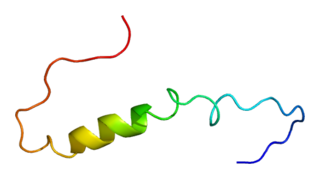
Chloride channel accessory 1 is a protein that in humans is encoded by the CLCA1 gene.

Chloride intracellular channel 4, also known as CLIC4, is a eukaryotic gene.

Voltage-dependent L-type calcium channel subunit beta-4 is a protein that in humans is encoded by the CACNB4 gene.

Chloride channel accessory 2 is a protein that in humans is encoded by the CLCA2 gene.

Calcium-activated potassium channel subunit beta-2 is a protein that in humans is encoded by the KCNMB2 gene.

Chloride transport protein 6 is a protein that in humans is encoded by the CLCN6 gene.

Proprotein convertase subtilisin/kexin type 4 is an enzyme that in humans is encoded by the PCSK4 gene.

Choline transporter-like protein 4 is a protein that in humans is encoded by the SLC44A4 gene.

Allograft inflammatory factor 1-like is a protein that is encoded by the AIF1L gene in humans.

Mucin-20 is a protein that in humans is encoded by the MUC20 gene.

Low-density lipoprotein receptor-related protein 10 is a protein that in humans is encoded by the LRP10 gene.

Calcium-activated potassium channel subunit beta-4 is a protein that in humans is encoded by the KCNMB4 gene.

Apoptosis-related protein 3 is a protein that in humans is encoded by the ATRAID gene.

Kin of IRRE-like protein 2, also known as NEPH3, is a protein that in humans is encoded by the KIRREL2 gene. It is primarily expressed in β cells of the pancreatic islets.

Potassium channel subfamily K member 17 is a protein that in humans is encoded by the KCNK17 gene.

TOX4 also known as KIAA0737, is a human gene.

Voltage-gated potassium channel subunit beta-3 is a protein that in humans is encoded by the KCNAB3 gene. The protein encoded by this gene is a voltage-gated potassium channel beta subunit.

Chloride channel accessory 3, also known as CLCA3, is a protein which in humans is encoded by the CLCA3P pseudogene. The protein encoded by this gene is a chloride channel. According to the HGNC, this protein is not expressed in humans but is in certain other species such as mouse. However, some conflicting reports state that human cells produce and glycosylate this protein.

Chloride intracellular channel protein 3 is a protein that in humans is encoded by the CLIC3 gene. This protein is a chloride channel.

Dipeptidase 3 (DPEP3) is a protein that in humans is encoded by the DPEP3 gene.
















